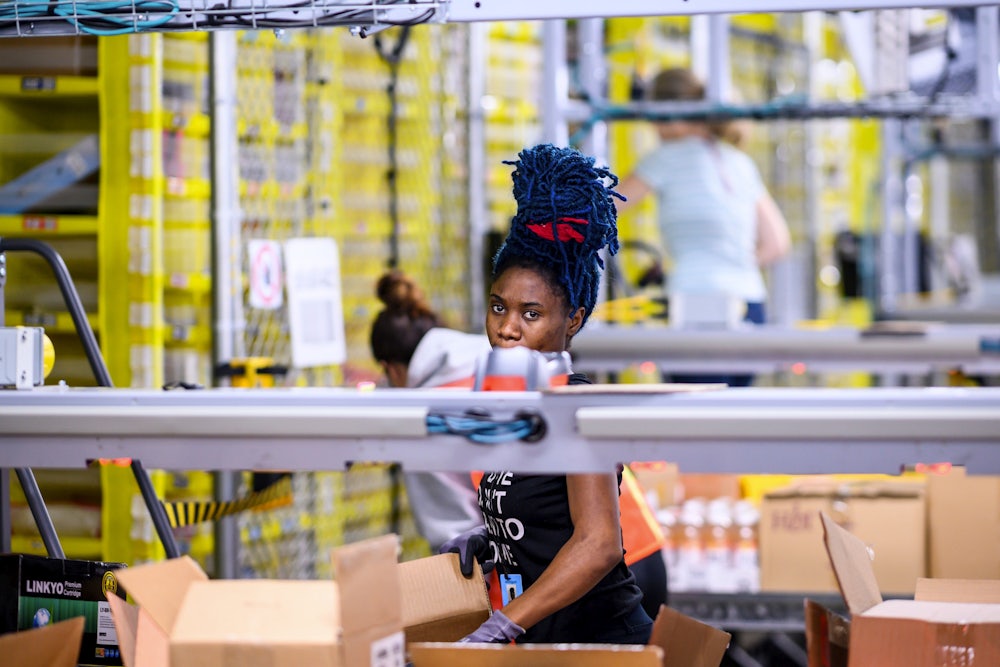Some 5,800 people who work at the Amazon warehouse in Bessemer, Alabama, a town just outside of Birmingham, will receive union ballots on Monday. They have until March 29 to decide whether they want to affiliate with the Retail, Wholesale, and Department Store Union, or RWDSU, and in doing so, defy the wishes of Jeff Bezos, one of the richest men in the world.
Amazon is the second-largest employer in the United States, and one of the most powerful companies on the planet. The pandemic, as one financial analyst put it, served as a “growth hormone” for the e-commerce giant. After the government sent money to the U.S. population and shuttered much of the retail industry—Amazon’s competition—many of those dollars wound up in Amazon’s coffers. The results were record profits and a mind-boggling hiring spree. On an earnings call earlier this month, the company said it had added 175,000 employees in Q4 alone, more than triple the number added in the same period of 2019. As for Amazon’s founder, Bezos’s estimated wealth grew by around $100 billion during the pandemic.
On the other side of the fight are the Bessemer workers. Sick of exhausting productivity goals and relentless monitoring by management, they approached RWDSU over the summer. The union had previously organized at an Amazon warehouse in Staten Island. But workers at that location were fired after escalating their efforts (Amazon insists that the firings were not retaliation), and the union has not filed for an election. When Bessemer workers approached it about a possible campaign, RWDSU redirected organizing resources from poultry plants, its regional stronghold, to Amazon.
It’s pure David and Goliath, though maybe that doesn’t fully capture it. Bezos is worth $184 billion; the median household income in Bessemer is just over $30,000. One in four residents live in poverty. This is a man who has everything trying to crush a town. Should the organizing drive succeed, the Bessemer employees will be the first Amazon workers to unionize in the U.S. A smaller effort, involving a few dozen technicians in Middleton, Delaware, was defeated in 2014, with a vote of 21 (no) to 6 (yes).
The question of how this happened is one Bezos is probably asking himself, wondering how his union-detection algorithms failed to predict an organizing drive at this location, and one that emerged so quickly. Usually it takes years for the newness of a facility to wear off, while here, not even the $15.30 starting wage, more than double the Alabama minimum of $7.25, could stave off a union push, which happened within months of the warehouse’s opening in March of last year.
Part of the story is that this isn’t just Alabama; it’s Bessemer.
The Birmingham-Bessemer region was once a center of both the steel and iron industries, as well as home to coal and iron-ore mines. Coal strikes were a regular occurrence, and it was a stronghold of the United Mine Workers of America, responsible for Alabama having a 25 percent union membership rate by the mid-twentieth century. For context, that’s higher than any state’s current union membership rate. Deindustrialization decimated these numbers: In 2020, only 8 percent of Alabama workers were union members.
While there were segregated union locals, as in much of the South, there were also left-led, multiracial unions such as the International Union of Mine, Mill, and Smelter Workers (Mine Mill, for short). In the latter, as described by historian Robin D.G. Kelley, “the prevalence of Black workers and the union’s egalitarian goals gave the movement an air of civil rights activism.”
It’s a description that bears more than a passing resemblance to the campaign at Amazon. As The New York Times reports, the majority of the Amazon workforce in Bessemer is Black, and so are the people leading the union organizing. These organizers are other RWDSU members, rank-and-file workers employed in poultry plants and other RWDSU-affiliated shops in the region. Rather than shying away from discussing race and racism, the campaign is confronting the issue head-on, building on the summer’s protests against policing.
“We see it as much of a civil-rights battle as a labor battle,” RWDSU President Stuart Appelbaum told Bloomberg. “The overwhelming majority, perhaps, greater than 85% of the workers at this facility are African American. And their major concern seems to be that they’re not treated with respect.”
Lack of respect is Amazon’s business model. Its warehouses have nearly double the standard rate of serious injuries in the industry. As the pandemic began to spread across the country, Amazon refused to communicate with workers about outbreaks at its facilities—as of October 2020, 20,000 Amazon workers had contracted Covid-19. When workers organized walkouts to force the company to address their health and safety concerns, Amazon fired them. Workers are monitored down to the second, and reprimanded if they spend more than the company’s preferred amount of “time off-task.” Given the size of the warehouses—the one in Bessemer is 885,000 square feet—this can lead workers to put off going to the bathroom and, in some cases, to pee in bottles. While Amazon insists that it reduced productivity quotas during the pandemic and is giving employees time to wash their hands, workers say otherwise. As one Bessemer worker told The Prospect, “They work you to death.”
In this campaign’s approach, Kelley tells me, RWDSU is “politically, ideologically, tactically, a descendant of Bessemer’s [Mine Mill union].”
It has to be, if it’s going to speak to the concerns of the workers. The salience of the matter comes through in an anecdote told to the Times by Mona Darby, a Black poultry-processing-plant worker who is helping lead the Amazon campaign. Outside the Bessemer warehouse,
a white man approached her and said that Amazon didn’t want a union and that he didn’t want her “Black ass on our property.”
“You are going to see my Black ass out here all day, every day,” Ms. Darby said she had responded.
As a flyer once distributed by the Ku Klux Klan in Birmingham read, “Alabama is a good place for good negroes to live in, but it is a bad place for negroes who believe in SOCIAL EQUALITY.” Over the last century, local labor organizers have faced assassination attempts, near-fatal beatings, and arrests—in the 1930s, Bart Logan, secretary of the Bessemer Communist Party, was jailed for sedition after being found with a copy of this very publication.
This isn’t ancient history. RWDSU organizer Henry Jenkins, who was targeted by the Klan and shot in 1964, only passed away in 2011. As Kelley tells me, some of the region’s most dynamic anti-racist labor struggles took place in the 1960s through the 1980s, as deindustrialization led to an increase in police violence, the concentration of poverty, and the rise of Black elected leadership. Anti-racism and a desire for respect are animating concerns for Bessemer workers on and off the shop floor. That RWDSU has chosen to embrace a worker-led, anti-racist model suggests that this is very much a living legacy.
Amazon has never hidden its opposition to unions, and in Bessemer, it has done everything it can to defeat the effort. After workers at the warehouse filed a petition in November with the National Labor Relations Board, notifying the agency of their desire to hold a union election, the company hired union-busting law firm Morgan Lewis to slow down the process.
Morgan Lewis focused on two things: the size of the proposed bargaining unit and the method of voting. With respect to the former, Amazon’s representatives rejected RWDSU’s proposed 1,500-person unit, which excluded truck drivers, temporary and seasonal workers, and maintenance and robotics employees. Instead, it insisted on a roughly 5,800-person unit. Amazon ultimately won the argument. While there is reason to worry about this—a larger bargaining size with more temporary workers means much more work for organizers—reports that the union had over 3,000 authorization cards signed by mid-January suggest quick progress and reason for hope.
As to the method of voting, Amazon’s representatives minimized workers’ health and safety concerns by insisting on in-person voting. This, despite the fact that Jefferson County, where the facility is located, saw 17 percent coronavirus positivity rates in January. The company’s lawyers suggested renting out hotel rooms and buses exclusively for NLRB staff who would oversee the election, an offer the Board declined. On Friday, the NLRB firmly rejected the company’s latest appeal for in-person voting.
“Companies like to hold the vote at the workplace and require people to come there,” says labor historian Nelson Lichtenstein. “Then they can coerce the people who are least engaged to vote, and they’ll vote no. But with a mail-in ballot, the least engaged won’t vote, and that makes it a little more likely the union will win.”
Amazon, out of ways to delay the election, is still running a standard anti-union campaign. What this means is holding captive-audience meetings, where workers are required to listen to fearmongering by management. Those who speak up face attempts at intimidation: One worker says management took a photo of his employee badge after he refuted their anti-union rap. The company is bombarding workers with its perspective. “Where will your dues go?” ask flyers in the warehouse’s bathrooms. Some employees are receiving five texts a day urging them not to turn against “the winning team.” A website created by Amazon, which features cutesy drawings of dogs next to photos of workers giving the camera a thumbs-up, encourages workers to use the hashtag #DoItWithoutDues. On social media, the hashtag is mostly used by union supporters trolling the company.
“They’re getting cheated by their law firm,” jokes Lichtenstein, referring to the propaganda as “old” and “stale.” Of the “Do It Without Dues” slogan, he notes that even this is inaccurate, as employees in right-to-work Alabama are not required to pay dues.
What happens now is up to the Bessemer workers. Employers rely on workers’ labor, and when workers use that power, what seems impossible can quickly become reality. A strike last month at the Hunts Point produce market in New York City won 1,400 workers a 70-cents-an-hour raise, when previously they’d been told the employer could go no higher than 32 cents. The workers there believed in their power, and they were right. High-profile politicians are weighing in on the vote—and Biden should side with the union—but no one can stop Amazon except the workers on whom it relies.
“We’ve done crazy things together and then made them normal,” Bezos wrote in a memo to Amazon employees announcing that he would be stepping down as CEO. He’s right. The things they’ve done are crazy—crazy enough that on the day Bezos stepped down, the Federal Trade Commission fined Amazon $61.7 million for stealing its drivers’ tips. It’s this disregard for workers’ rights, not to mention our obligations to one another, that Amazon wants to make normal. It is an anti-social, winner-take-all, model: extractive, degrading. That is what the workers in Bessemer are fighting, and why the eyes of the world are turned to them.








